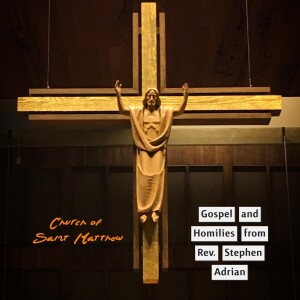
Monday Nov 04, 2024
11.21.2020 Homily
St. Matthew's gospel is divided into three books. The first book is the story of the infancy of Jesus, and it's the first two chapters. The second book is the story of the ministry of Jesus, and that's from chapter three to the end of chapter 25. It closes with the passage of the gospel today. And then the third book opens on the beginning of chapter 26 and is the story of the suffering, death, and resurrection of Jesus. But this middle part is where Jesus gives the instruction about what it is to be His disciple. And He concludes it with the passage from today's gospel. As if that summarizes everything that He had tried to teach them, everything He had tried to instill within them.
The gospel today lays out the foundation on which is built a relationship with Jesus. The foundation is the living of the corporal works of mercy. Doing the works of mercy is in fact, making an act of faith. You see for Jesus, faith or belief is not a noun. Faith or belief is a verb. You do faith, or you do belief. At the heart of this believing, this faith, is a deep sense of gratitude for the gifts of God, a recognition that all that I am and all that I have is not mine. It is God's gift, and I'm invited to be a custodian of that. I'm invited to use that. I'm invited to work that. I'm invited to share those gifts with my neighbor, with my sisters and brothers, especially with those who are the smallest, the marginal, the ones whose name no one knows. In other words, the least of my sisters and brothers. It is there that faith is found.
We stand on the edge of the only true and unique American holy day, the feast of Thanksgiving. In fact, it is a holy day of obligation because normally there is a command that every member of the family gather around the table that day and give thanks. Even in the midst of a great challenge, in the midst of this pandemic, you and I are called to give thanks and to speak and to act with gratitude.
Now, I have a story I want to tell you. Martin Rickart was born in 1586. His father was a poor coppersmith. He lived in Eilenberg, Germany. When a position for deacon arrived in 1610, he applied but was not accepted, and disappointed, he accepted work in a Lutheran church school. But in May of 1611, he worked his way into the diaconate of St. Anne's church in Eisleben. And proving his value through hard work, his hometown of Eilenberg invited him to come home and to be their pastor.
Now in 1618, the 30 years' war broke out. And because Eilenberg was a walled city, refugees from the countryside poured into the city for safety. The overcrowding of the city combined with the consequences of war and a serious lack and shortage of food in 1637, a plague arose and wreaked havoc upon the city and upon the continent. It was up to Martin to provide pastoral care for the entire town and for the refugees it held. In that first year, more than 8,000 people died with the plague. And Martin often had to bury as many as 50 people a day, including his own wife.
Martin survived the ordeal, and it finally appeared that there would be relief, and perhaps even the beginning of peace, and the end of the war. Martin's children were traumatized by what they experienced--the plague and the war. They were traumatized by seeing their neighbors and friends die. They were traumatized by seeing illness all around them. Their lives seemed very dark and they had nightmares.
Martin had to find some way of teaching his children, in the middle of that darkness, that there was reason to give thanks and to show gratitude to God. So he wrote a hymn, a hymn that his children could sing around the dinner table, Nun danket alle Gott. He taught it also to his congregation and it was later translated into English as "Now Thank We All Our God." His simple, but noble expression of thankfulness has provided us with one of the most beloved hymns of the Christian Church. A hymn that is far too often relegated only to the Thanksgiving season.
It was written just as the plague began to hit his hometown. And this hymn became the theme of Martin's life. “Now thank we all our God, with hearts and hands and voices, who wondrous things has done, in whom his world rejoices, who from our mother's arms, has blessed us on our way, with countless gifts of love, and still is ours today.”
And then just in case it was not playing just in case people did not quite get it, the second verse, spelled it out further. And think of the devastation. The thousands of neighbors and friends who had died, the sound of war raging around and Martin had his children sing, "Oh, may this bounteous God through all our life be near us. With ever joyful hearts and blessed peace to cheer us. May he keep us in his grace and guide us when perplexed, may he free us from all ills in this world and the next.”
In an age of anxiety fueled by yet another plague, this one a virus that sweeps across the globe, those words of Martin Rickart are worth remembering today as well. It might be well for this hymn to become, if you will, the battle cry of believing people during this epidemic. A statement that even in the midst of darkness, even in the midst of suffering, even in the midst of fear, we stand and we give thanks to God.
No comments yet. Be the first to say something!